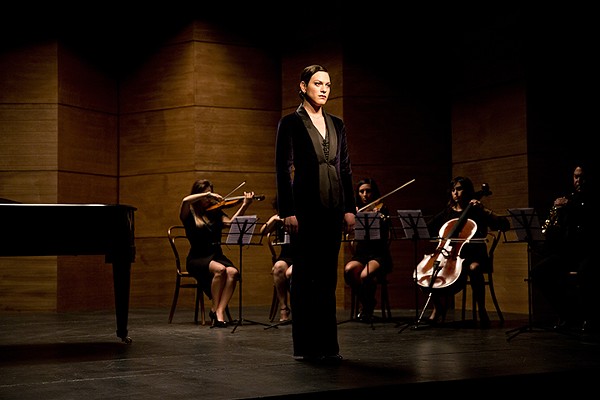A Fantastic Woman
Una Mujer Fantástica (A Fantastic Woman) FL, 2017, 3 ¾ stars
Chilean drama tackles transgender rights
From The Orlando Weekly, March 1, 2018
Fantastic, like awesome, has lost most of the power of its original meaning and is now a sullied synonym for great. But in naming his film A Fantastic Woman, Chilean writer-director Sebastián Lelio has embraced all interpretations of the word – political correctness be both damned and respected – to create a film that honors gender identity while challenging our notion of what it means to be transgender.
Marina, a transgender woman and aspiring singer, is in love with Orlando, a wealthy man 30 years her senior. Though their love is unconventional, they have high hopes for their future together – until Orlando dies unexpectedly. Instead of being allowed to grieve, Marina is ostracized by Orlando’s family.
“Sorry if it’s crude and blunt of me to say this, but I really think that this is just perversion,” Orlando’s ex-wife tells Marina. “When I look at you, I don’t know what I’m seeing.”
Instead of anger, this insult produces sad, quiet resignation in Marina. “You’re normal,” she responds.
Shot and scored beautifully and fashioned with a fittingly deliberate pace – the pace of grief – the film features intriguing supporting performances but is powered by newcomer Daniela Vega as Marin. Chile’s first openly transgender model, actress and singer, Vega never strays far from her stoic, mesmerizing, almost one-note performance, but one always gets the sense that she herself has lived a life not dissimilar to her character’s.
Those of you who have grown weary of films themed to a particular social or human-rights topic will be glad to know that Lelio’s movie is not just an “issues picture.” After all, we’ve too often in recent years seen audiences and critics swoon over films with well-intentioned messages but poor production values and heavy-handed direction. A Fantastic Woman is not that type of film. Admittedly, it’s hampered slightly by some structural mediocrity and second-act predictability. But just like “Time,” the haunting Alan Parsons Project song that Lelio weaves into his cinematic fabric, the film asks: “Who knows when we shall meet again, if ever?” Of course, it’s unable to answer life’s most unanswerable question, but the fact that it’s brave enough to ask it – especially in the context of transgender rights – has earned it a place among the Oscar nominees for best foreign-language film.
If it feels like you’ve seen the story before, you have (sort of). Orlando’s own Billy Manes bravely spoke and wrote about the discrimination he faced as a gay man following the death of his long-time partner in 2012. Manes told his story both in the pages of The Orlando Weekly and in an award-winning short documentary, Billy & Alan. Though the details of his story are different from those in A Fantastic Woman, local audiences and LGBT activists will be reminded of the issues Manes fought his entire life for.
“Saying goodbye to a loved one when he dies is a basic human right, isn’t it?” Marina asks. But it’s really the movie posing the question. It’s up to the audience to ponder the repercussions when and if the answer comes back “no.”
© 2018 Orlando Weekly / MeierMovies, LLC
Note: After the original publication of this review, A Fantastic Woman won the Oscar for best foreign-language film.
